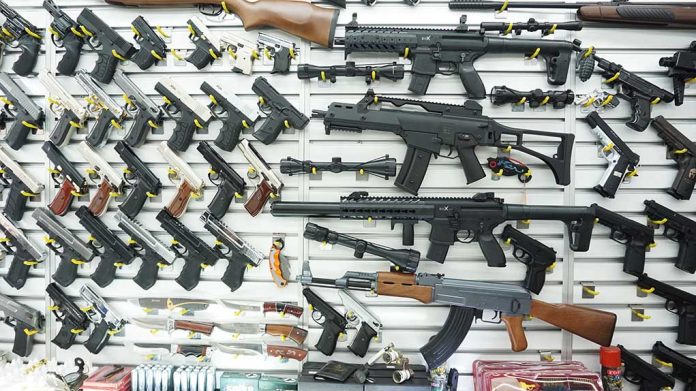
Rhode Island’s newly passed “assault weapons ban” exposes the hollow strategy of Democrats who prefer political theater over substantive solutions to the complex issues facing Americans.
Key Takeaways
- Rhode Island lawmakers approved a watered-down “assault weapons” ban that prohibits future sales but not current possession, with violators facing up to 10 years in prison or a $10,000 fine.
- The bill passed along largely partisan lines with a 25-11 vote in the Senate and 43-28 in the House, with some Democrats joining Republicans in opposition.
- Even gun control advocates criticized the legislation as “severely weakened” and “the weakest assault weapons ban in the country,” highlighting the ineffectiveness of the measure.
- The ban is based on emotional reactions rather than factual evidence, as the targeted firearms are not “high-powered” and are rarely used in crimes compared to handguns.
Another Reactionary Ban With No Real Impact
In a predictable move that typifies the left’s approach to complex societal issues, Rhode Island’s Democrat-controlled legislature has passed a scaled-back “assault weapons” ban that will do virtually nothing to address actual gun violence. The bill, which bans future transactions of certain semiautomatic rifles but not their possession, passed the Senate with a 25-11 vote and the House with a 43-28 vote. Governor Dan McKee has confirmed he will sign this ineffective measure into law, making Rhode Island the 11th state to implement such restrictions.
The legislation was sponsored by Democratic Senator Lou DiPalma and faced opposition from seven Democrats and four Republicans in the Senate. The final version of the bill, renamed “Unlawful Sale of Prohibited Firearms,” narrowed the definitions of banned firearms and removed requirements for registering grandfathered weapons. This watered-down approach has left both sides unsatisfied, with gun rights advocates seeing it as an unconstitutional overreach and some gun control advocates criticizing it as too weak.
Even Gun Control Advocates Call It Useless
In a telling development that exposes the performative nature of this legislation, prominent gun control advocates have publicly criticized the Rhode Island ban as ineffective. The Rhode Island Coalition Against Gun Violence (RICAGV) expressed frustration with the compromised bill, revealing the political theater at play. When even dedicated anti-gun organizations are disappointed with your gun control measure, you know it’s merely for show and not for substance.
“In a state where all of our general officers and the majority of legislators in both the House and Senate, including the Speaker and Senate President, are gun safety champions, it makes absolutely no sense that we have to accept this severely weakened version of the assault weapons ban,” said RICAGV Executive Director Melissa Carden.
Meanwhile, Governor McKee celebrated this hollow victory, seemingly oblivious to the fact that his party’s own advocates see through the charade: “I’m proud that Rhode Island took an important step forward in protecting our communities from gun violence. I included an assault weapons ban in my budget for this very reason — and as a result, tonight we saw progress.”
Emotion Over Facts: The Liberal Playbook
This legislation exemplifies the left’s approach to governance: react emotionally to high-profile incidents, ignore statistical realities, and implement broad restrictions that burden law-abiding citizens while failing to address actual problems. The firearms targeted by this ban are not the “high-powered” weapons that Democrats claim. In reality, most so-called “assault weapons” fire intermediate-power cartridges that are less powerful than many hunting rifles, and they are rarely used in violent crimes compared to handguns.
The ban focuses on cosmetic features and scary-looking firearms rather than addressing the root causes of violence. This approach deliberately misleads the public by suggesting that removing certain types of firearms will somehow reduce violence, when all evidence points to the contrary. It’s a classic case of politicians exploiting fear to expand government control while ignoring mental health issues, enforcement of existing laws, and cultural decay that actually drive violent behavior.
Constitutional Concerns and Wasted Resources
Beyond its practical ineffectiveness, Rhode Island’s ban raises serious constitutional questions. The Supreme Court has increasingly recognized that the Second Amendment protects commonly-owned firearms, which certainly includes the modern sporting rifles targeted by this legislation. Americans own tens of millions of these firearms for legitimate purposes including self-defense, sport shooting, and hunting. By criminalizing their sale, Rhode Island lawmakers are setting themselves up for costly legal challenges that will waste taxpayer resources.
The pattern is frustratingly familiar: liberal politicians implement reactionary policies designed to signal virtue rather than solve problems, taxpayers foot the bill for inevitable court challenges, and constitutional rights are trampled in the process. Meanwhile, the actual drivers of violence remain unaddressed, ensuring that the cycle will continue and politicians can propose yet more ineffective “solutions” to problems they’ve failed to solve.



